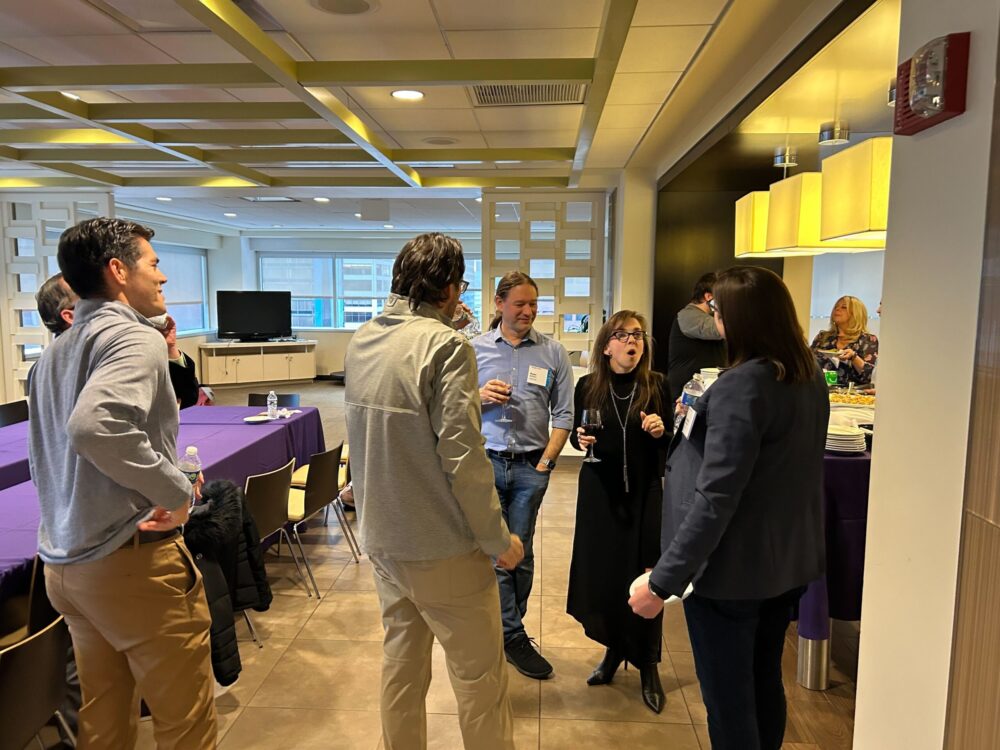There’s the unpredictable — like a pandemic that accelerated digital transformation — and the unforeseen inventions that end up leading the pack. Back in December 2019, for instance, Technical.ly asked Philadelphia tech leaders to tell us what they thought the next 10 years were going to bring to the city, and we heard hopes for the rise in green tech, diversity, accessibility and drones. Though artificial intelligence was already going strong in a variety of industries in 2019, who could have predicted the quick adaption of generative AI chatbot ChatGPT?
Last week, when Technical.ly gathered founders whose companies made our 2023 RealLIST Startups list last week, we asked them a similar question, lightning-round style: From where you stand now, which new and future technologies are most exciting to you and your business?
Many at the table were quick to mention ChatGPT or other AI-driven tools.
That includes Ted Mann, cofounder of collectables app CollX: “I’m already looking at how to potentially use that in my current business.”
AI is already at the center of Aaron Vontell’s company, Regression Games. The gaming studio makes a platform that lets players write code and develop artificial intelligence that controls characters, debugs strategies, and competes in tournaments by building bots for existing video games. He already uses ChatGPT in the product, he said.

RealLIST Startups founders mingling at Morgan Lewis. (Photo by Paige Gross)
Anthony Wehbe, founder of care-at-home company Sena Health said opportunities are plenty in the healthcare space with AI. The industry has traditionally been late to adapt to new tech trends, but he’s seeing AI and predictive analytics work well for patient care. He’s also excited about how inexpensive hardware has gotten for medical devices — “so it becomes more ubiquitous for all patients,” Wehbe said.
Some founders are skeptical of AI, though, like Nicole Lipkin, founder of kid-focused mental health app HeyKiddo: “I just don’t think as humans we know how to not take it too far,” she said.
Cofounders Kristy and Nate Carabello, behind vertigo-tracking app Vertige, are interested in how virtual reality could assist those living with vertigo.
“There could be potential to have somebody put on a VR headset, monitor their eye movements, and then … be able to put them in a state of non-vertigo, non-spinning,” Kristy Carabello said. “That’s really exciting.”
For BOSS.Tech cofounders Ryan Buchert and Felicite Moorman, who are building an automated business operating solution for small to medium-sized companies, blockchain technologies are most exciting. The pair’s platform will gather all the APIs from subscriptions like SalesForce, Monday.com and others to have a cohesive place for business owners to check in on the status of their business operations. They’re bringing all that data to one place — and “you can’t train AI without data,” Buchert said.

This editorial article draws from an event underwritten by Morgan Lewis, a Technical.ly Ecosystem Builder client. Morgan Lewis did not review it prior to publication.
Before you go...
Please consider supporting Technical.ly to keep our independent journalism strong. Unlike most business-focused media outlets, we don’t have a paywall. Instead, we count on your personal and organizational support.
3 ways to support our work:- Contribute to the Journalism Fund. Charitable giving ensures our information remains free and accessible for residents to discover workforce programs and entrepreneurship pathways. This includes philanthropic grants and individual tax-deductible donations from readers like you.
- Use our Preferred Partners. Our directory of vetted providers offers high-quality recommendations for services our readers need, and each referral supports our journalism.
- Use our services. If you need entrepreneurs and tech leaders to buy your services, are seeking technologists to hire or want more professionals to know about your ecosystem, Technical.ly has the biggest and most engaged audience in the mid-Atlantic. We help companies tell their stories and answer big questions to meet and serve our community.
Join our growing Slack community
Join 5,000 tech professionals and entrepreneurs in our community Slack today!

The person charged in the UnitedHealthcare CEO shooting had a ton of tech connections

From rejection to innovation: How I built a tool to beat AI hiring algorithms at their own game

Where are the country’s most vibrant tech and startup communities?



